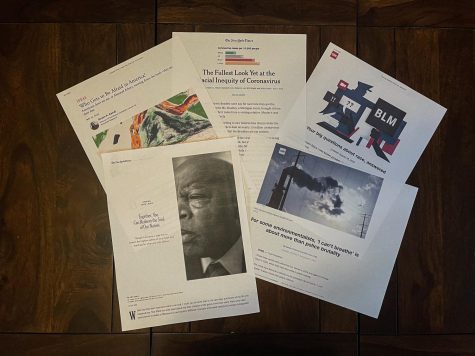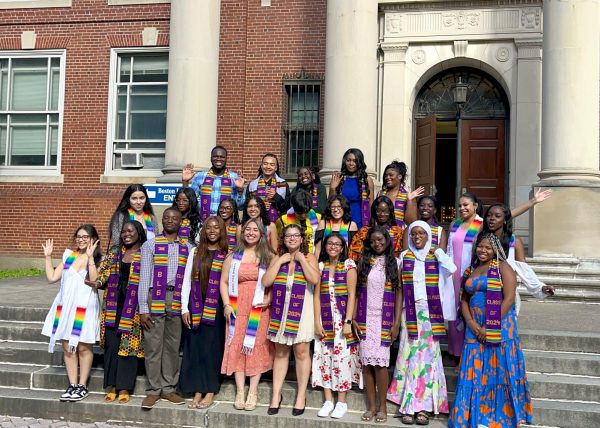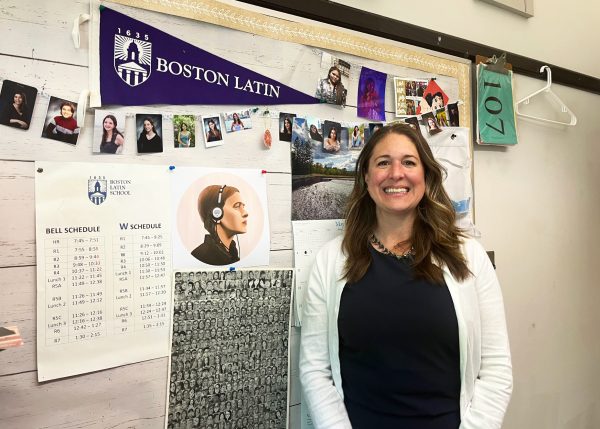Discussions to Drive Out Discrimination

Recent events have brought long-standing issues regarding racism in America to the forefront of our conversations and sparked schoolwide discussions on race, from pieces by the late John Lewis to an event highlighting the experiences of Black, Indigenous and people of color (BIPOC) community members.
Over the past summer, Boston Latin School students looked at a collection of articles and videos loaded with information about why people have been fighting for change. Named the “August Reads,” they discuss systemic racism, the purpose of the Black Lives Matter movement, and also provide detail into what individual roles people can play to help dismantle racism in their communities.
In additional efforts to increase education about these important issues, many homeroom teachers have initiated discussions on race and topics that affect students as people. Ms. Nicole Fernandez finds that it is essential for faculty to play a role in addressing racial justice at school, one way being through these discussions. “The best thing we can do is educate our students and continue to give them the opportunity to speak up about their ideals,” she says.
For example, during a week in October, teachers were prompted to ask their homerooms questions surrounding the August Reads. Students provided their reactions to the articles and the effect of racism on people’s daily lives. On election week, homeroom teachers also screen-shared presentations on the election process, emphasizing the importance of being well-informed.
While these discussions were unique to each homeroom, Ms. Fernandez found that participation was often low and many students instead took to Zoom’s private chat function to express their opinions. She explains, “Worry that you’ll be misunderstood, that you’ll be judged, or that your position will upset people. It keeps us quiet, student and adult alike, even if we know we should be speaking up.”
Shelsie Jean Laurent (I), president of Black Leaders Aspiring for Change and Knowledge (BLACK), expresses that while the presentations and discussions were heading in the right direction of educating students on race, there needed to be more representation. After discussion with BLACK and Head of School Rachel Skerrit, she believes that there should be students of color educating peers about the history and perspective of BIPOC community members.
“I think students of color should have played a more crucial role in teaching teachers how to lead the conversations,” Jean Laurent says. “We should have heard from students instead of reading off a slideshow.”
To continue the conversation of race and education beyond homeroom discussions, cultural clubs, including BLACK and Asian Students in Action (ASIA), hosted a BIPOC Town Hall on Friday, November 20. During this session, students, faculty and administrators collaborated to discuss race, equity and how BLS can work towards creating a safe environment for everyone. The ethnic reach of future articles and videos, ways to incorporate more white students in discussions of race and reframing Western curriculum were just a few of the constructive talking points that made their way into the meeting.
Those who attended found that the level of engagement heavily contributed to the effectiveness of this session. “When talking to a peer of mine, we were impressed with the participation and inclusion of students and faculty, who were all able to share their opinions on the subject at hand,” says participant Ethan Nguyen (III).
Through their contributions, attendees showed how they were not only invested in improving the atmosphere of the school for those currently involved in the BLS community, but also for future students.
Jean Laurent explains that the goal of this event is to open more eyes and educate students and teachers on race within society and more specifically, BLS. She emphasizes that without acceptance and education, progress cannot be made. “This is the best time to show that unity is the first step in moving forward.”
The culture clubs plan on hosting more BIPOC Town Halls in the future. From utilizing provided resources on race to participating in wider discussions, Head of School Skerrit stresses the importance of this increase in race-related schoolwide dialect, saying, “If we are graduating the future leaders of society, we can’t separate issues of race and equity as something that happens outside of school education. It is vital to being a socially conscious citizen of the world.”





